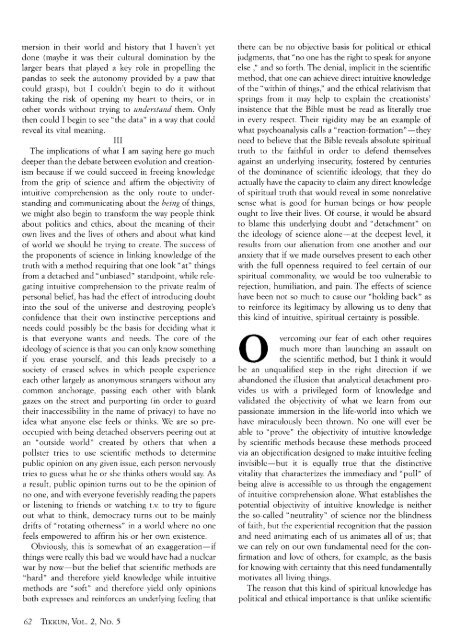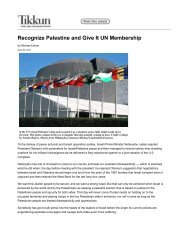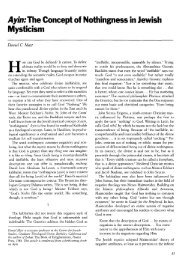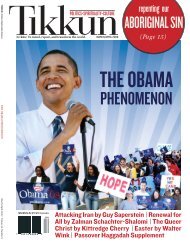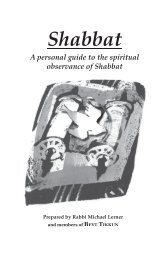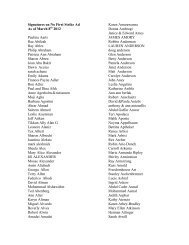Creationism and the Spirit of Nature - Tikkun Magazine
Creationism and the Spirit of Nature - Tikkun Magazine
Creationism and the Spirit of Nature - Tikkun Magazine
You also want an ePaper? Increase the reach of your titles
YUMPU automatically turns print PDFs into web optimized ePapers that Google loves.
mersion in <strong>the</strong>ir world <strong>and</strong> history that I haven't yet<br />
done (maybe it was <strong>the</strong>ir cultural domination by <strong>the</strong><br />
larger bears that played a key role in propelling <strong>the</strong><br />
p<strong>and</strong>as to seek <strong>the</strong> autonomy provided by a paw that<br />
could grasp), but I couldn't begin to do it without<br />
taking <strong>the</strong> risk <strong>of</strong> opening my heart to <strong>the</strong>irs, or in<br />
o<strong>the</strong>r words without trying to underst<strong>and</strong> <strong>the</strong>m. Only<br />
<strong>the</strong>n could I begin to see "<strong>the</strong> data" in a way that could<br />
reveal its vital meaning.<br />
I11<br />
The implications <strong>of</strong> what I am saying here go much<br />
deeper than <strong>the</strong> debate between evolution <strong>and</strong> creation-<br />
ism because if we could succeed in freeing knowledge<br />
from <strong>the</strong> grip <strong>of</strong> science <strong>and</strong> affirm <strong>the</strong> objectivity <strong>of</strong><br />
intuitive comprehension as <strong>the</strong> only route to under-<br />
st<strong>and</strong>ing <strong>and</strong> communicating about <strong>the</strong> being <strong>of</strong> things,<br />
we might also begin to transform <strong>the</strong> way people think<br />
about politics <strong>and</strong> ethics, about <strong>the</strong> meaning <strong>of</strong> <strong>the</strong>ir<br />
own lives <strong>and</strong> <strong>the</strong> lives <strong>of</strong> o<strong>the</strong>rs <strong>and</strong> ahout what kind<br />
<strong>of</strong> world we should he trying to create. The success <strong>of</strong><br />
<strong>the</strong> proponents <strong>of</strong> science in linking knowledge <strong>of</strong> <strong>the</strong><br />
truth with a method requiring that one look "at" things<br />
from a detached <strong>and</strong> "unbiased" st<strong>and</strong>point, while rele-<br />
gating intuitive comprehension to <strong>the</strong> private realm <strong>of</strong><br />
personal belief, has had <strong>the</strong> effect <strong>of</strong> introducing doubt<br />
into <strong>the</strong> soul <strong>of</strong> <strong>the</strong> universe <strong>and</strong> destroying people's<br />
confidence that <strong>the</strong>ir own instinctive perceptions <strong>and</strong><br />
needs could possibly he <strong>the</strong> basis for deciding what it<br />
is that everyone wants <strong>and</strong> needs. The core <strong>of</strong> <strong>the</strong><br />
ideology <strong>of</strong> science is that you can only know something<br />
if you erase yourself, <strong>and</strong> this leads precisely to a<br />
society <strong>of</strong> erased selves in which people experience<br />
each o<strong>the</strong>r largely as anonymous strangers without any<br />
common anchorage, passing each o<strong>the</strong>r with blank<br />
gazes on <strong>the</strong> street <strong>and</strong> purporting (in order to guard<br />
<strong>the</strong>ir inaccessibility in <strong>the</strong> name <strong>of</strong> privacy) to have no<br />
idea what anyone else feels or thinks. We are so pre-<br />
occupied with being detached observers peering out at<br />
an "outside world" created by o<strong>the</strong>rs that when a<br />
pollster tries to use scientific methods to determine<br />
public opinion on any given issue, each person nervously<br />
tries to guess what he or she thinks o<strong>the</strong>rs would say. As<br />
a result, public opinion turns out to be <strong>the</strong> opinion <strong>of</strong><br />
no one, <strong>and</strong> with everyone feverishly reading <strong>the</strong> papers<br />
or listening to friends or watching t.v. to try to figure<br />
out what to think, democracy turns out to be mainly<br />
drifts <strong>of</strong> "rotating o<strong>the</strong>rness" in a world where no one<br />
feels empowered to affirm his or her own existence.<br />
Obviously, this is somewhat <strong>of</strong> an exaggeration-if<br />
things were really this bad we would have had a nuclear<br />
war by now-but <strong>the</strong> belief that scientific methods are<br />
"hard" <strong>and</strong> <strong>the</strong>refore yield knowledge while intuitive<br />
methods are "s<strong>of</strong>t" <strong>and</strong> <strong>the</strong>refore yield only opinions<br />
both expresses <strong>and</strong> reinforces an underlying feeling that<br />
62 TIKKUN, VOL. 2, No. 5<br />
<strong>the</strong>re can be no objective basis for political or ethical<br />
judgments, that "no one has <strong>the</strong> right to speak for anyone<br />
else ," <strong>and</strong> so forth. The denial, implicit in <strong>the</strong> scientific<br />
method, that one can achieve direct intuitive knowledge<br />
<strong>of</strong> <strong>the</strong> "within <strong>of</strong> things," <strong>and</strong> <strong>the</strong> ethical relativism that<br />
springs from it may help to explain <strong>the</strong> creationists'<br />
insistence that <strong>the</strong> Bible must be read as literally true<br />
in every respect. Their rigidity may be an example <strong>of</strong><br />
what psychoanalysis calls a "reaction-formationn-<strong>the</strong>y<br />
need to believe that <strong>the</strong> Bible reveals absolute spiritual<br />
truth to <strong>the</strong> faithful in order to defend <strong>the</strong>mselves<br />
against an underlying insecurity, fostered by centuries<br />
<strong>of</strong> <strong>the</strong> dominance <strong>of</strong> scientific ideology, that <strong>the</strong>y do<br />
actually have <strong>the</strong> capacity to claim any direct knowledge<br />
<strong>of</strong> spiritual truth that would reveal in some nonrelative<br />
sense what is good for human beings or how people<br />
ought to live <strong>the</strong>ir lives. Of course, it would be absurd<br />
to blame this underlying doubt <strong>and</strong> "detachment" on<br />
<strong>the</strong> ideology <strong>of</strong> science alone-at <strong>the</strong> deepest level, it<br />
results from our alienation from one ano<strong>the</strong>r <strong>and</strong> our<br />
anxiety that if we made ourselves present to each o<strong>the</strong>r<br />
with <strong>the</strong> full openness required to feel certain <strong>of</strong> our<br />
spiritual commonality, we would be too vulnerable to<br />
rejection, humiliation, <strong>and</strong> pain. The effects <strong>of</strong> science<br />
have been not so much to cause our "holding back" as<br />
to reinforce its legitimacy by allowing us to deny that<br />
this kind <strong>of</strong> intuitive, spiritual certainty is possible.<br />
0<br />
vercoming our fear <strong>of</strong> each o<strong>the</strong>r requires<br />
much more than launching an assault on<br />
<strong>the</strong> scientific method, but I think it would<br />
be an unqualified step in <strong>the</strong> right direction if we<br />
ab<strong>and</strong>oned <strong>the</strong> illusion that analytical detachment provides<br />
us with a privileged form <strong>of</strong> knowledge <strong>and</strong><br />
validated <strong>the</strong> objectivity <strong>of</strong> what we learn from our<br />
passionate immersion in <strong>the</strong> life-world into which we<br />
have miraculously been thrown. No one will ever be<br />
able to "prove" <strong>the</strong> objectivity <strong>of</strong> intuitive knowledge<br />
by scientific methods because <strong>the</strong>se methods proceed<br />
via an objectification designed to make intuitive feeling<br />
invisible-but it is equally true that <strong>the</strong> distinctive<br />
vitality that characterizes <strong>the</strong> immediacy <strong>and</strong> "pull" <strong>of</strong><br />
being alive is accessible to us through <strong>the</strong> engagement<br />
<strong>of</strong> intuitive comprehension alone. What establishes <strong>the</strong><br />
potential objectivity <strong>of</strong> intuitive knowledge is nei<strong>the</strong>r<br />
<strong>the</strong> so-called "neutrality" <strong>of</strong> science nor <strong>the</strong> blindness<br />
<strong>of</strong> faith, but <strong>the</strong> experiential recognition that <strong>the</strong> passion<br />
<strong>and</strong> need animating each <strong>of</strong> us animates all <strong>of</strong> us; that<br />
we can rely on our own fundamental need for <strong>the</strong> confirmation<br />
<strong>and</strong> love <strong>of</strong> o<strong>the</strong>rs, for example, as <strong>the</strong> basis<br />
for knowing with certainty that this need fundamentally<br />
motivates all living things.<br />
The reason that this kind <strong>of</strong> spiritual knowledge has<br />
political <strong>and</strong> ethical importance is that unlike scientific


